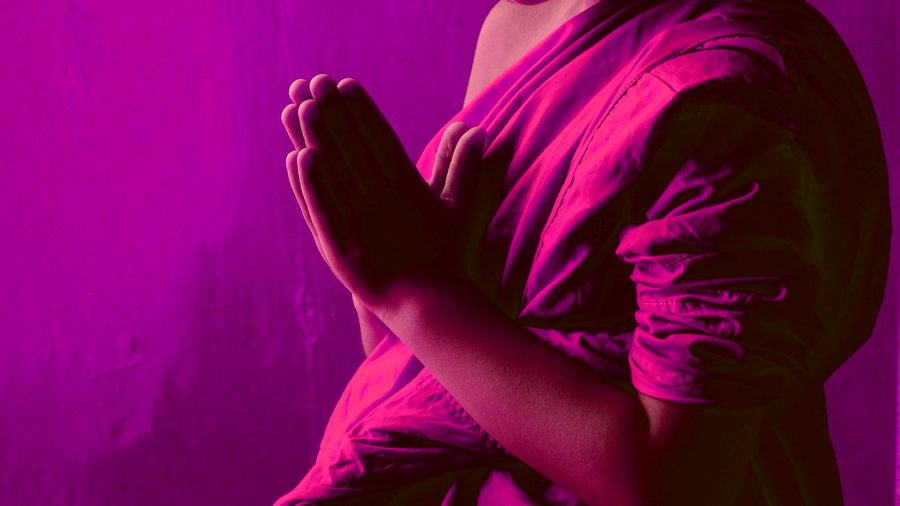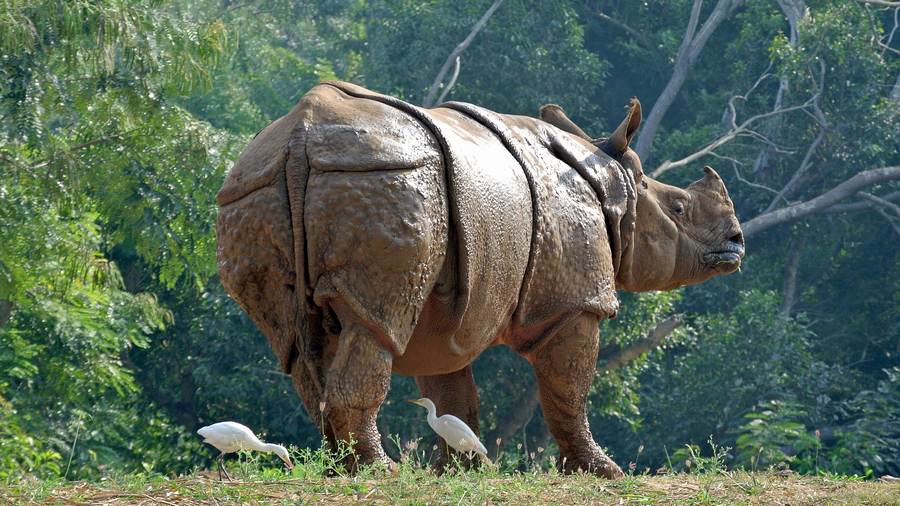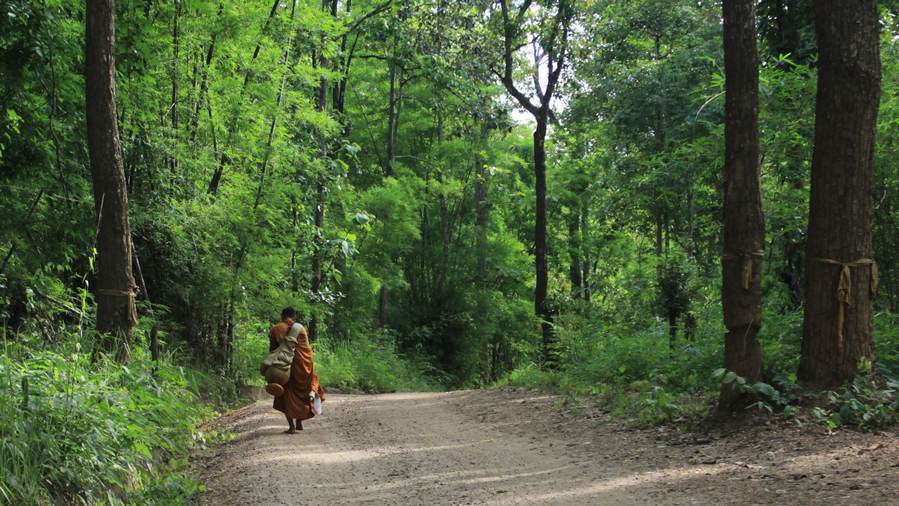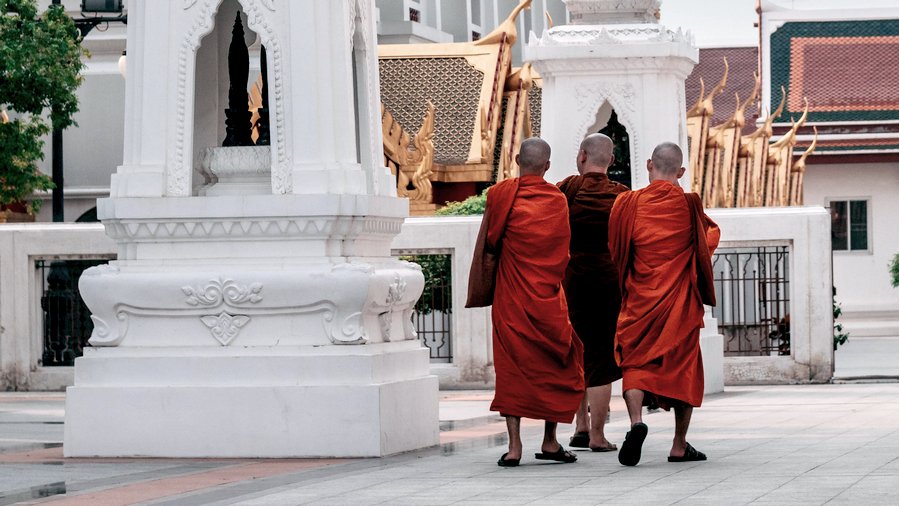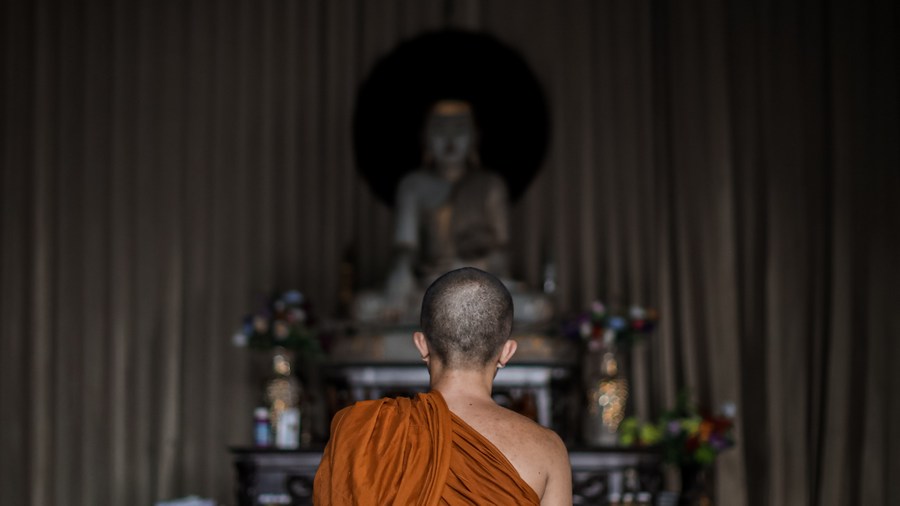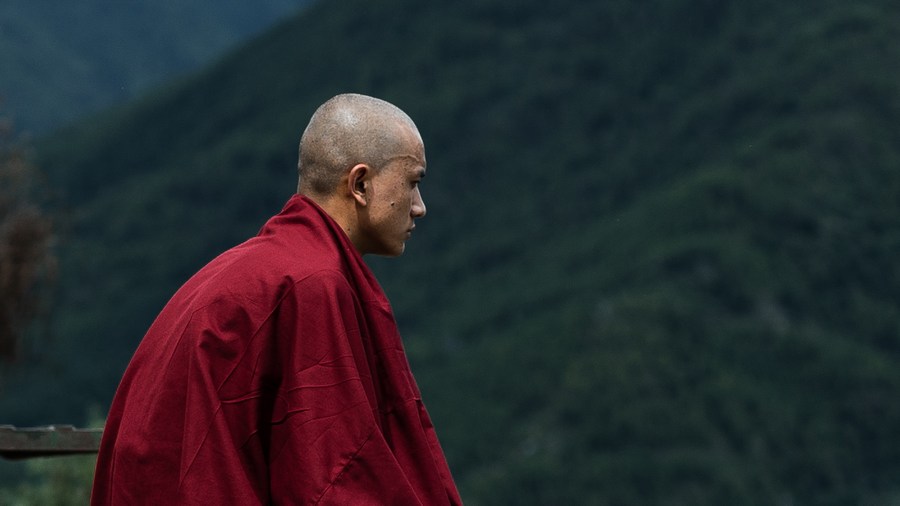Renouncing violence
for all living beings,
harming not even one of them,
you would not wish for offspring,
so how a companion?
Wander alone
like a rhinoceros.
For a person by nature entangled
there are affections;
on the heels of affection, this pain.
Seeing the drawback born of affection,
wander alone
like a rhinoceros.
One whose mind
is enmeshed in sympathy
for friends & companions,
neglects the goal.
Seeing this danger in intimacy,
wander alone
like a rhinoceros.
Like spreading bamboo,
entwined,
is concern for offspring & spouses.
Like a bamboo sprout,
unentangling,
wander alone
like a rhinoceros.
As a deer in the wilds,
unfettered,
goes for forage wherever it wants:
The observant person, valuing freedom,
wanders alone
like a rhinoceros.
In the midst of companions
—when staying at home,
when going out wandering—
you are prey to requests.
Valuing the freedom
that no one else covets,
wander alone
like a rhinoceros.
There is sporting & love
in the midst of companions,
& abundant love for offspring.
Feeling disgust
at the prospect of parting
from those who’d be dear,
wander alone
like a rhinoceros.
Without resistance in all four directions,
content with whatever you get,
enduring troubles without panic,
wander alone
like a rhinoceros.
They are hard to please,
some of those gone forth,
as well as those living the household life.
Being unconcerned
with the offspring of others,
wander alone
like a rhinoceros.
Cutting off the householder’s marks,
like a kovilara tree
that has shed its leaves,
the enlightened one, cutting all household ties,
wanders alone
like a rhinoceros.
If you gain an astute companion,
a fellow traveler, right-living, enlightened,
overcoming all troubles,
go with him, gratified,
mindful.
If you don’t gain an astute companion,
a fellow traveler, right-living & wise,
wander alone
like a king renouncing his kingdom,
like the elephant in the Mataṅga wilds,
[his herd].
We praise companionship
—yes!
Those on a par, or better,
should be chosen as friends.
If they’re not to be found,
living faultlessly,
wander alone
like a rhinoceros.
Seeing radiant bracelets of gold,
well-made by a smith,
clinking, clashing,
two on an arm,
wander alone
like a rhinoceros,
[Thinking:]
“In the same way,
if I were to live with another,
there would be conversation or attachment.”
Seeing this future danger,
wander alone
like a rhinoceros.
Because sensual pleasures,
elegant, honeyed, & charming,
bewitch the mind with their manifold forms—
seeing this drawback in sensual strings—
wander alone
like a rhinoceros.
“Calamity, tumor, misfortune,
disease, an arrow, a danger for me.”
Seeing this danger in sensual strings,
wander alone
like a rhinoceros.
Cold & heat, hunger & thirst,
wind & sun, horseflies & snakes:
Enduring all these, without exception,
wander alone
like a rhinoceros.
As a great white elephant,
with massive shoulders,
renouncing his herd,
lives in the wilds wherever he wants,
wander alone
like a rhinoceros.
“There’s no way
that one delighting in company
can touch even momentary release.”
Heeding the words
of the Kinsman of the Sun,
wander alone
like a rhinoceros.
Transcending the contortion of views,
the sure way attained,
the path gained,
[realizing:]
“Unled by others,
I have knowledge arisen,”
wander alone
like a rhinoceros.
With no greed, no deceit,
no thirst, no hypocrisy—
delusion & blemishes
blown away—
with no inclinations for all the world,
every world,
wander alone
like a rhinoceros.
Avoid the evil companion
disregarding the goal,
intent on the discordant way.
Don’t associate yourself
with someone heedless & hankering.
Wander alone
like a rhinoceros.
Consort with one who is learned,
who maintains the Dhamma,
a great & quick-witted friend.
Knowing the meanings,
subdue your perplexity,
[then] wander alone
like a rhinoceros.
Free from longing, finding no pleasure
in the world’s sport, ardor, or sensual bliss,
abstaining from adornment,
speaking the truth,
wander alone
like a rhinoceros.
Abandoning offspring, spouse,
father, mother,
riches, grain, relatives,
& sensual pleasures
altogether,
wander alone
like a rhinoceros.
“This is a bondage.
There’s little happiness here,
next to no enjoyment,
all the more suffering & pain.
This is a boil”:
Knowing this, circumspect,
wander alone
like a rhinoceros.
Shattering fetters,
like a fish in the water tearing a net,
like a fire not coming back to what’s burnt,
wander alone
like a rhinoceros.
Eyes downcast, not footloose,
senses guarded, with protected mind,
not soggy, not burning,
wander alone
like a rhinoceros.
Taking off the householder’s marks,
like a coral tree
that has shed its leaves,
going forth in the ochre robe,
wander alone
like a rhinoceros.
Showing no greed for flavors, not wanton,
going from house to house for alms
with mind unenmeshed in this family or that,
wander alone
like a rhinoceros.
Abandoning barriers to awareness,
expelling all defilements—all—
non-dependent, cutting aversion,
affection,
wander alone
like a rhinoceros.
Turning your back on pleasure & pain,
as earlier with sorrow & joy,
attaining pure
equanimity,
tranquility,
wander alone
like a rhinoceros.
With persistence aroused
for the highest goal’s attainment,
with mind unsmeared, not lazy in action,
firm in effort, with steadfastness & strength arisen,
wander alone
like a rhinoceros.
Not neglecting seclusion, jhāna,
constantly living the Dhamma
in line with the Dhamma,
comprehending the danger
in states of becoming,
wander alone
like a rhinoceros.
Intent on the ending of craving & heedful,
neither drooling nor dumb,
but learned, mindful,
—having reckoned the Dhamma—
certain & striving,
wander alone
like a rhinoceros.
Unstartled, like a lion at sounds.
Unsnared, like the wind in a net.
Unsmeared, like a lotus in water:
Wander alone
like a rhinoceros.
Like a lion—forceful, strong in fang,
living as a conqueror, the king of beasts—
resort to a solitary dwelling.
Wander alone
like a rhinoceros.
At the right time consorting
with the release through goodwill,
compassion,
empathetic joy,
equanimity,
unobstructed by all the world,
any world,
wander alone
like a rhinoceros.
Having let go of passion,
aversion,
delusion;
having shattered the fetters;
unfazed at the ending of life,
wander alone
like a rhinoceros.
People follow & associate
for a motive.
Friends without a motive these days
are rare.
They’re shrewd for their own ends, & impure.
Wander alone
like a rhinoceros.
Read this translation of Sn 1.3 A Rhinoceros by Bhikkhu Ṭhanissaro on DhammaTalks.org.Or read a different translation on SuttaCentral.net or DhammaTalks.org. Or listen on SC-Voice.net. Or explore the Pali on DigitalPaliReader.online.
Or read a translation in Afrikaans, Čeština, Deutsch, Français, Magyar, Bahasa Indonesia, Italiano, 日本語, မြန်မာဘာသာ, Nederlands, Norsk, Português, Русский, සිංහල, Slovenščina, or தமிழ். Learn how to find your language.

